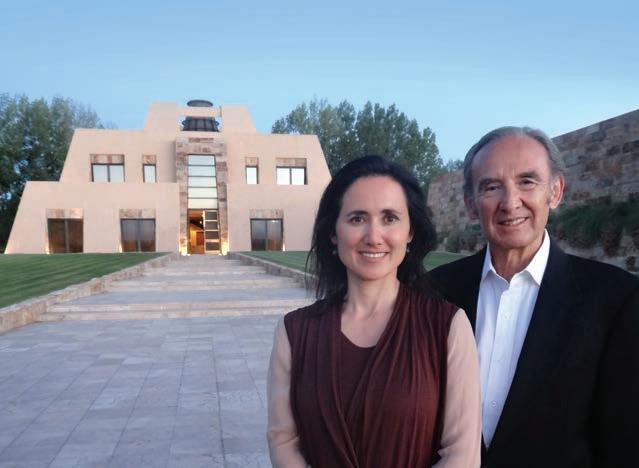
4 minute read
LAURA CATENA
Argentina’s Wonder Woman
Written by Bonnie Graves
It’s rare and kind of cool when a woman becomes virtually synonymous with a given wine region; in an industry traditionally dominated by men, these female leaders in positions of visibility help to encourage a rising generation of women in the field. In the Champagne region of France, business-savvy women like the widows Clicquot and Laurent-Perrier normalized women in decision-making roles in the 19th century. Today that tradition continues with women running several of the top grande marque houses.
Argentina also has a wonder woman, but instead of a widowed dowager inheriting her husband’s business interests, this one is a practicing medical doctor with an impressive educational background all her own.
Laura Catena may have been born into one of Argentina’s most storied wine-producing families, but her energy and her vision have revitalized the family business in a truly impressive way. Currently serving as Managing Director of Bodega Catena Zapata, Laura also manages her own winery in Mendoza called Luca while somehow working part-time as a pediatrician in San Francisco. That’s quite a commute for a busy mother of three!

The Catena wines are in many ways emblematic of the history of Argentina’s wine industry and its early dependence on immigrant labor. Because so much of the vineyard work was undertaken by Spaniards and Italians with a healthy daily consumption habit consistent with their homelands, Argentine wine production initially was more about quantity than quality. Frankly, it was anonymous wine sold in bulk, and that’s a reputation that is hard to shake once entrenched in consumers’ minds. (See that more recent cautionary yellow tale that helped drive Australia’s mono-variety shiraz boom down deep into the discount racks.)
Founded by Laura’s great-grandfather Nicola Catena, an immigrant from the Marche region of Italy, Catena Zapata’s first vineyard was planted near Luján in the Mendoza Valley in 1902. Malbec, known then as la uva francesa, was popularized by Michel Aimé Pouget, who touted the grape’s prodigiousness on the vine. Production among these early industrial “smokestack” wineries in the region ramped up, and by just 1915, Argentina had already become the 6th largest producer of wine in the world.
It would fall to Laura’s dad, Nicolás Catena, the grandson of Nicola, to change Catena from a forgettable volume player to a brand that has firmly established Argentina as a fine wine player. Like Laura, Nicolás also completed some of his education in the US with graduate work at Columbia and at the University of Chicago in Applied Economics.

The legendary “Judgement of Paris” tasting in 1976, combined with a fortuitous visit to Mondavi’s property in the 1980s, convinced Nicolás that Catena could be transformed, a conviction that quickly became a passion. He hired top names like José Galante, Guy Ruhland, and Paul Hobbs, visionary winemakers who brought a new sensibility to both vineyard management practices and to winemaking techniques. The shift from high-yield to better-yield began, and when Laura officially joined the family business in 1995, the time was right to take Catena into yet another period of expansion and improvement.
Essential to Catena’s next-gen push is Laura’s scientific/ medical background. What for many winemakers remained anecdotal or accidental – the notion of “terroir” - was quantified by Laura’s research into the soils and microclimates of her family’s holdings. Loosely put, terroir is the concept of place speaking through a wine, e.g., the ability to discern site-specific aromas and textures based on a wine’s place of origin.

It’s the polar opposite of manufactured wine, and Laura’s success in founding the Catena Institute has helped to legitimize terroir by grounding it firmly in science. A joint partnership between UC Davis and the Universidad Nacional de Cuyo, the Catena Institute continues to conduct world-class research into the complex relationship between farming grapes and bottling juice.

I met with Laura over lunch a few years back. As a high-energy, bilingual wine enthusiast myself, I came away duly impressed by her enthusiasm and seemingly limitless energy. Recent adventures for Laura have included conducting a tasting of five benchmark Catena wines on the Great Wall of China and hosting a UC Davis lecture entitled “How Science Can Preserve the Ancient Art of Winemaking,” a hot topic that allows both natural, low-intervention wine enthusiasts and more clinically-controlled winemakers to understand each other’s interdependence. And I imagine she has more than a few Zoom meetings scheduled in 2020, too. For anyone interested in top-tier malbec, the flagship red variety of Argentina, the wines of Catena are a must. Their suite of wines, in general, are now unequivocally world class. Bodega Zapata Catena and Luca wines are widely available online or at your local retailer throughout the US. www.catenawines.com.










